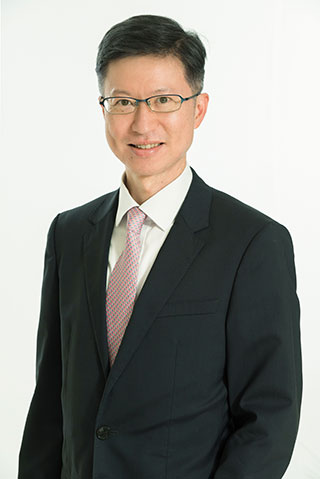Ernest CH LEE
FCG HKFCG(PE)
Better Governance. Better Future.

FCG HKFCG(PE)
‘After qualifying as a professional accountant, I gave some thought to what I would like to achieve in my career and I decided to take the Institute’s examinations to broaden my understanding of corporate governance.
The Institute’s qualification has been valuable in my career as a professional accountant and auditor. For example, when I was still doing audit fieldwork I would need to look at companies’ board minutes and the Institute’s qualification provided me with a better understanding of what I should expect as an auditor in terms of how board meetings should be held and what should be discussed. I could then question the client about any key issues missed by the board.
Professional auditors need to be sceptical and should raise questions when key issues do not appear to have been discussed by the board. At the same time, however, our focus will also be on advising our clients on ways to improve their board processes. This goes for all governance professionals – they need to bear in mind that their work is not only a compliance exercise and they should always be looking for opportunities to bring improvements to internal processes.
Topics like boardroom dynamics now play a bigger role in the Institute’s Chartered Governance Qualifying Programme (CGQP). The addition of this, together with topics like risk management, to the CGQP is a good development and will help prepare governance professionals for their roles as key advisers to the board. That task has become more complex as governance professionals now need to advise directors about a much wider range of issues that come to the board's attention.’
‘As the Chairman of the HKICPA Financial Reporting Standards Committee in the past three years, I was involved in the setting of financial reporting standards in Hong Kong. Hong Kong adopted International Financial Reporting Standards (IFRS) in 2005 and these are principles-based. They set the baseline principles you have to follow in financial reporting. The newly created International Sustainability Standards Board (ISSB) will also set baseline principles to be followed rather than listing everything that companies need to disclose. I think governance professionals, to be successful, need to be aware of the baseline principles for better governance and to really understand the rationale behind the rules. Rules and laws cannot spell out exactly what you need to do in every possible situation. In practice, given the increasing complexity of the operating environment, companies have to apply the principles rather than just follow a box-ticking approach.’
‘There are many things the Institute is already doing. Firstly, the Institute’s professional qualification helps to develop the capabilities of practitioners in Hong Kong and those interested to join us from the Mainland. The Institute also influences the setting of good governance standards and regulations in Hong Kong through our consultation submissions, and our research and advocacy work. But I would like to see a further strengthening of our efforts in generating leadership materials and publications. Working with the many different parties we partner with, we can further develop our governance leadership to stay at the forefront rather than just following governance standards. We can also help stimulate the interest of the market, and generate meaningful discussions among market participants and different stakeholders, about best practices and the way forward for governance.’

‘I can understand that some companies may prefer that approach because it makes it easier for them to be seen to be complying with the requirements. It also makes it easier for auditors to evaluate whether a company has met all of the relevant requirements, but I think overall we need to strike a balance between the principles-based and rules-based approaches taking into account the information needs of the users of company reports. The box-ticking approach often leads to very lengthy disclosures that may not really be useful to investors and other users of that information – what they need is information that will really help them to evaluate the performance and the future of the company.’
‘I think this is a very significant step since it makes it possible to have a comprehensive global baseline of high-quality sustainability disclosure standards. That will facilitate consistent and comparable disclosures on sustainability matters across different jurisdictions. I think it is too early, at this stage, to really know what the standards will look like. The IFRS Foundation has set out prototype general disclosure standards and climate-related disclosure standards. These are based on the criteria used by the Task Force on Climate-related Financial Disclosures (TCFD) as well as other standard setters, but I believe they are aiming to have the first proposed standards ready on a timely basis in 2022 for global public consultation’
‘There are a number of different organisations that have views on governance matters, but we need to be seen as the governance institute. As I mentioned earlier, this will mean continuing to strengthen our thought leadership work, but we should also consider how the public in general perceives the Institute and the governance professional. In the past, members of the public, if they were not in the business world, had some difficulty understanding what a company secretary does. I hope to help broaden the awareness of the community, not just our stakeholders in the business world, of the roles that our members play and the positive impact we have.’
‘‘Yes. Our recent renaming and rebranding is a great approach to take because nowadays our members, myself included, come from many different backgrounds. I'm not a company secretary, and even those working as company secretaries have adopted a broader, more governance-focused mindset. Our members need to work with many different people, both inside and outside their organisations, to achieve good governance. As the operating environment has become more complex, governance professionals can bring major benefits to their organisations. But I would also like to emphasise that the renaming and rebranding is not just a matter of saying what we're doing, it is important that we are seen to deliver on those promises. So, all in all, I hope that the broader community will have a better perception as to what the Institute and it’s members can achieve.’
‘I think this is a continuous transition process. Leveraging the change of name and post-nominals, as well as the rebranding of the Institute, there has been tremendous promotion and stakeholder outreach focusing on the transition of the profession. Recognising more needs to be done, the Institute will be launching a new programme of brand awareness building exercise following the unveiling of its new brand on 20 January 2022.
‘That's an interesting question. The training and work experience of the Institute’s members provides the best foundation to become a governance professional because it gives experience and expertise in, among other areas, compliance with the rules and regulations, in risk management and in advising and having a close working relationship with board members. But a governance professional cannot hope to become an expert in all of the areas relevant to governance. A company secretary cannot replace an accountant, just as an accountant cannot replace a company secretary – governance professionals need to bring relevant expertise together to generate positive impacts for the company.
I don't think that this leads to a danger that the ‘governance expert’ brand will be claimed by other professionals. I see the roles of Chartered Governance Professionals (CGPs) as being similar to those of family medicine specialists. My daughter is studying medicine and, talking together, we realised there are many similarities between the two roles. Family medicine specialists provide continuous and comprehensive health care for individuals, but they call on the specific expertise of other specialist doctors when they need to. Similarly, governance professionals know when to consult with an accountant, a lawyer or a regulator.’
‘We are experiencing a highly dynamic environment at the moment and what we were doing five years ago is already quite different from what we are doing now. ‘Purposeful governance’ is certainly a trend that senior managers of companies are looking at. Nowadays, people are not only focusing on short-term, or even medium-term profitability, they're looking more at the sustainability of the business. That requires looking at the purpose of the business and how the business can serve the community. The approach that focuses on what organisations can provide to the community, rather than what they can take from the community, supports the sustainability, not only the organisation itself, but also the broader environment and society. So I'm a very strong supporter of the trend towards purposeful governance.
Another major trend to follow, of course, is that of technological change. Often, when this topic comes up, people think of the danger that new technology will take their jobs. While many aspects of work can be automated, at the same time a lot of jobs are being created by new technology. Some of my firm's work in auditing can be automated, for example, but this has led professionals to change their approach and focus on the aspects of the work that cannot be easily replaced by automation, at least at this stage.
In the same way, some aspects of governance professionals’ roles can be automated – taking the minutes of board meetings for example is now often automated. So in the medium-term future, we may well see some shift in the work the Institute’s members will be doing. This is a good opportunity, however, for everyone to focus on what is irreplaceable in their roles – such as the advice they can provide, their capacity for human interaction, and their ability to the use the knowledge and skills they have to make things happen.
I should add that, at this point in time, we cannot know exactly what direction our work will take. At the end of the day, an important aspect of our work is to support the growth of the business so we need to align ourselves with, and stay informed of, the ongoing changes.’